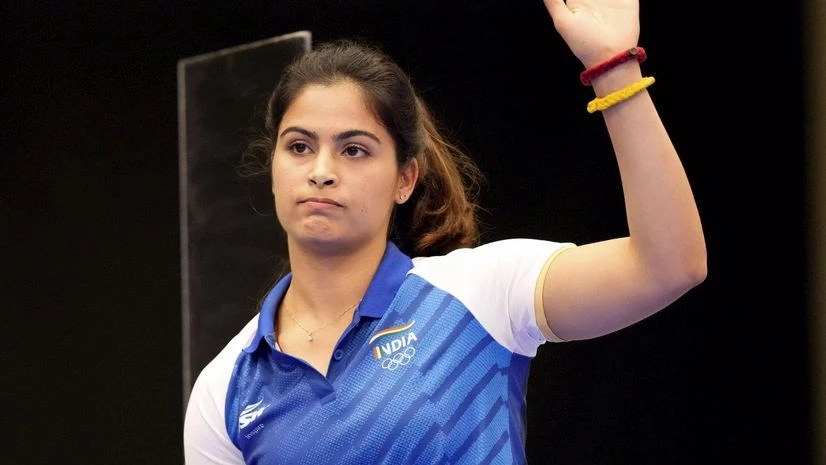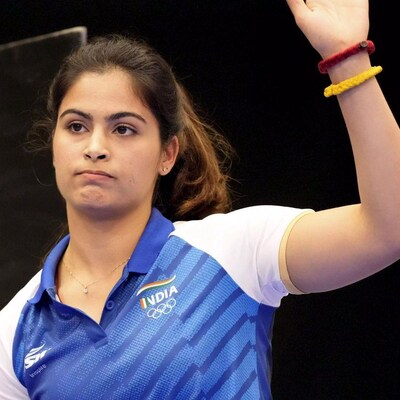[ad_1]
)
Manu Bhaker ends her Paris Olympics 2024 campaign with two Bronze medals.
Double Olympic-medallist shooter Manu Bhaker’s coach Jaspal Rana has slammed the national federation’s “ever-changing” Olympic selection policy, saying that it has hurt some of the most promising talents in the past and will damage more youngsters if there is no consistency going forward.
Rana, a pistol legend in his own right who won three Asiad gold medals in the 2006 edition, hardly minced words as he questioned the federation’s tendency to make last-minute changes to its policy, and its stubborn refusal to acknowledge or facilitate the presence of shooters’ personal coaches at national camps and trials.
He made these observations during a visit to PTI headquarters with Bhaker, who won bronze medals in 10m air pistol and 10m air pistol mixed team (alongside Sarabjot Singh), for an interaction with its editors on Friday.
“The (federation’s) selection policy changes every six months. I met the sports minister and told him ‘get the selection policy from the federation. Let them decide… whatever they decide, right or wrong, we are not discussing that, and then stick to it’.
“You will see the difference (in the performance of shooters),” said the decorated marksman.
Several talented shooters like Saurabh Chaudhary, the only one to make the 10m air pistol final at the Tokyo Games, and Asian Games gold-medallist pistol shooter Jitu Rai faded away in a matter of few of years at a time when they were among the brightest prospects for Olympic glory. Rana said the system failed them and many more.
“Where is (pistol shooter) Saurabh Chaudhary, where is (Asian Games gold medallist pistol shooter) Jitu Rai? Does anybody talk about them? No. Are we talking about (10m air rifle shooter) Arjun Babuta, who finished fourth in Paris? He missed the medal by a fraction,” the firebrand 48-year-old asked.
“Nobody is thinking how to get him back on the platform (again),” said Rana, who was allegedly told to leave the Karni Singh ranges by the federation’s High Performance Director Pierre Beauchamp during the Paris Olympics Selection Trials.
The National Rifle Association of India (NRAI) amended its selection criteria in 2021 after a second successive medal-less Olympic outing in Tokyo, drastically reducing the bonus points awarded to quota winners and re-introducing trials to decide the final squad after a considerable gap.
Earlier, the composition of the final squads was at NRAI’s discretion and quotas used to be swapped if the federation did not consider a shooter good enough.
Names were finalised based on NRAI’s own obscure assessment of the shooters’ performance leading up to the Games, causing anxiety among even the best of performers.
But even with the introduction trials, there was no consistency and NRAI faced criticism for restricting the number of shooters who could aim for an Olympic berth to just top five based on international and camp performances.
This made it impossible to even have a full field of eight shooters at the trials, which was widely ridiculed and criticised.
Rana said he wasn’t against change but would like more consistency during an Olympic cycle.
He said, currently, there is no mechanism to protect Olympic and world medallists and lamented that Bhaker, despite winning two medals in Paris, will have to fight for a place in the national squad once she returns from a three-month break.
“All the Olympic medallists, we don’t see them after one or two Olympics because there is no system by which we can protect them,” he observed
“The squad is selected from the Nationals. So, if she is not playing the Nationals, which she is not, then next year she will not get the facilities other shooters will get. Those who have competed in the Olympics and proved themselves, let them be there to compete in every trial,” the coach asserted.
Rana had to coach Bhaker from the spectators’ gallery at the Paris Games as he did not have the requisite accreditation for access to field of play. He was also lodged away from the Games village but the Dronacharya awardee said none of it had any impact on his zeal to see Bhaker succeed.
“They (federation’s restrictions) made us stronger by putting all the restrictions. We were ready for it and it didn’t affect us at all, not even one per cent. (The coordination) between me and Manu (is such that) we don’t need to talk and I think every coach has to learn that.”
“It used to be a long walk (to my hotel) from the range but she used to walk with me,” Rana said, to which Bhaker quipped, “It only made you fitter.”
The personal-versus-national-coach debate caused a lot of rancour in the lead-up to Paris.
Rana, when asked what was the solution going forward, said: “There cannot be two cooks (coaches). I think one person has to take the lead.”
“There has to be a little understanding and thankfully, there was little understanding this time.”
Bhaker, on her part, thanked Indian Olympic Association (IOA) president PT Usha for ensuring that Rana makes the trip to Paris to assist her.
“We requested PT Usha ma’am and she assured us that ‘you do your job and you just don’t bother about it’. I did not have to ask her again,” disclosed Bhaker.
(Only the headline and picture of this report may have been reworked by the Business Standard staff; the rest of the content is auto-generated from a syndicated feed.)
First Published: Aug 18 2024 | 1:18 PM IS
[ad_2]
Source link

